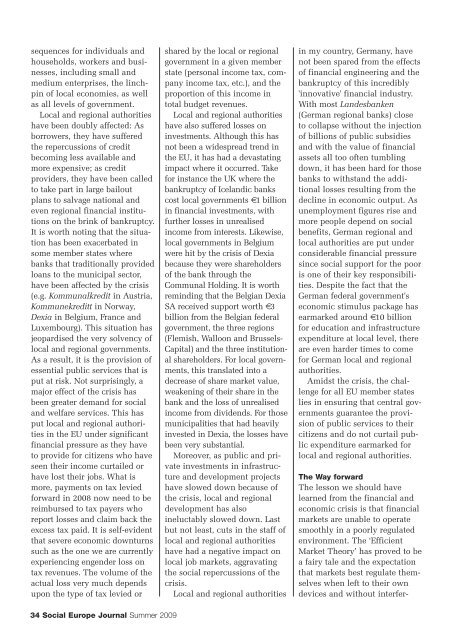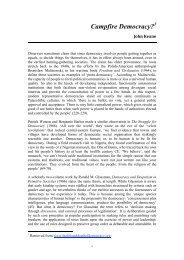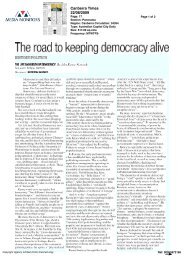The Ethics of Capitalism - Social Europe Journal
The Ethics of Capitalism - Social Europe Journal
The Ethics of Capitalism - Social Europe Journal
Create successful ePaper yourself
Turn your PDF publications into a flip-book with our unique Google optimized e-Paper software.
sequences for individuals and<br />
households, workers and businesses,<br />
including small and<br />
medium enterprises, the linchpin<br />
<strong>of</strong> local economies, as well<br />
as all levels <strong>of</strong> government.<br />
Local and regional authorities<br />
have been doubly affected: As<br />
borrowers, they have suffered<br />
the repercussions <strong>of</strong> credit<br />
becoming less available and<br />
more expensive; as credit<br />
providers, they have been called<br />
to take part in large bailout<br />
plans to salvage national and<br />
even regional financial institutions<br />
on the brink <strong>of</strong> bankruptcy.<br />
It is worth noting that the situation<br />
has been exacerbated in<br />
some member states where<br />
banks that traditionally provided<br />
loans to the municipal sector,<br />
have been affected by the crisis<br />
(e.g. Kommunalkredit in Austria,<br />
Kommunekreditt in Norway,<br />
Dexia in Belgium, France and<br />
Luxembourg). This situation has<br />
jeopardised the very solvency <strong>of</strong><br />
local and regional governments.<br />
As a result, it is the provision <strong>of</strong><br />
essential public services that is<br />
put at risk. Not surprisingly, a<br />
major effect <strong>of</strong> the crisis has<br />
been greater demand for social<br />
and welfare services. This has<br />
put local and regional authorities<br />
in the EU under significant<br />
financial pressure as they have<br />
to provide for citizens who have<br />
seen their income curtailed or<br />
have lost their jobs. What is<br />
more, payments on tax levied<br />
forward in 2008 now need to be<br />
reimbursed to tax payers who<br />
report losses and claim back the<br />
excess tax paid. It is self-evident<br />
that severe economic downturns<br />
such as the one we are currently<br />
experiencing engender loss on<br />
tax revenues. <strong>The</strong> volume <strong>of</strong> the<br />
actual loss very much depends<br />
upon the type <strong>of</strong> tax levied or<br />
<strong>The</strong> Way forward<br />
<strong>The</strong> lesson we should have<br />
learned from the financial and<br />
economic crisis is that financial<br />
markets are unable to operate<br />
smoothly in a poorly regulated<br />
environment. <strong>The</strong> ‘Efficient<br />
Market <strong>The</strong>ory’ has proved to be<br />
a fairy tale and the expectation<br />
that markets best regulate themselves<br />
when left to their own<br />
devices and without interfershared<br />
by the local or regional<br />
government in a given member<br />
state (personal income tax, company<br />
income tax, etc.), and the<br />
proportion <strong>of</strong> this income in<br />
total budget revenues.<br />
Local and regional authorities<br />
have also suffered losses on<br />
investments. Although this has<br />
not been a widespread trend in<br />
the EU, it has had a devastating<br />
impact where it occurred. Take<br />
for instance the UK where the<br />
bankruptcy <strong>of</strong> Icelandic banks<br />
cost local governments €1 billion<br />
in financial investments, with<br />
further losses in unrealised<br />
income from interests. Likewise,<br />
local governments in Belgium<br />
were hit by the crisis <strong>of</strong> Dexia<br />
because they were shareholders<br />
<strong>of</strong> the bank through the<br />
Communal Holding. It is worth<br />
reminding that the Belgian Dexia<br />
SA received support worth €3<br />
billion from the Belgian federal<br />
government, the three regions<br />
(Flemish, Walloon and Brussels-<br />
Capital) and the three institutional<br />
shareholders. For local governments,<br />
this translated into a<br />
decrease <strong>of</strong> share market value,<br />
weakening <strong>of</strong> their share in the<br />
bank and the loss <strong>of</strong> unrealised<br />
income from dividends. For those<br />
municipalities that had heavily<br />
invested in Dexia, the losses have<br />
been very substantial.<br />
Moreover, as public and private<br />
investments in infrastructure<br />
and development projects<br />
have slowed down because <strong>of</strong><br />
the crisis, local and regional<br />
development has also<br />
ineluctably slowed down. Last<br />
but not least, cuts in the staff <strong>of</strong><br />
local and regional authorities<br />
have had a negative impact on<br />
local job markets, aggravating<br />
the social repercussions <strong>of</strong> the<br />
crisis.<br />
Local and regional authorities<br />
in my country, Germany, have<br />
not been spared from the effects<br />
<strong>of</strong> financial engineering and the<br />
bankruptcy <strong>of</strong> this incredibly<br />
'innovative' financial industry.<br />
With most Landesbanken<br />
(German regional banks) close<br />
to collapse without the injection<br />
<strong>of</strong> billions <strong>of</strong> public subsidies<br />
and with the value <strong>of</strong> financial<br />
assets all too <strong>of</strong>ten tumbling<br />
down, it has been hard for those<br />
banks to withstand the additional<br />
losses resulting from the<br />
decline in economic output. As<br />
unemployment figures rise and<br />
more people depend on social<br />
benefits, German regional and<br />
local authorities are put under<br />
considerable financial pressure<br />
since social support for the poor<br />
is one <strong>of</strong> their key responsibilities.<br />
Despite the fact that the<br />
German federal government's<br />
economic stimulus package has<br />
earmarked around €10 billion<br />
for education and infrastructure<br />
expenditure at local level, there<br />
are even harder times to come<br />
for German local and regional<br />
authorities.<br />
Amidst the crisis, the challenge<br />
for all EU member states<br />
lies in ensuring that central governments<br />
guarantee the provision<br />
<strong>of</strong> public services to their<br />
citizens and do not curtail public<br />
expenditure earmarked for<br />
local and regional authorities.<br />
34 <strong>Social</strong> <strong>Europe</strong> <strong>Journal</strong> Summer 2009







